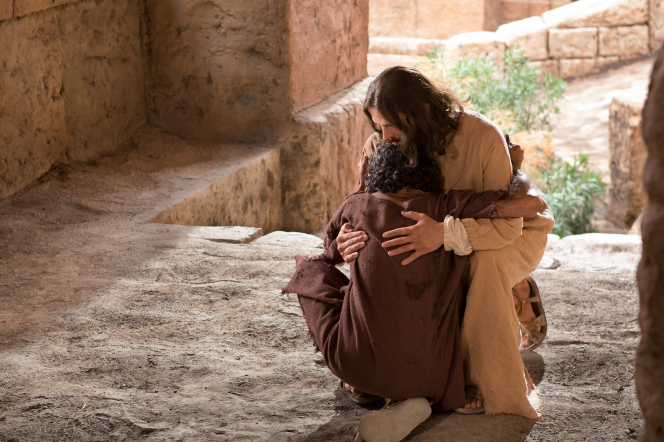The Complete Field Guide to Humility
I’m an extremely humble guy. Except for the fact that I think I’m humble. That’s not humility. But then acknowledging that I’m not humble makes me humble right? But then asking that question makes me not humble, while this question simultaneously makes me humble and then makes me not humble? Huh?
That’s pretty much how I feel about humility sometimes. It especially hits me when people give me compliments and I don’t know what to say. I could say, “Thanks so much. I know I’m awesome,” but that wouldn’t be humble. Maybe I’d say something like, “No, I was so bad,” but that is just fishing for another compliment. It is also personally degrading which I believe is wrong.
So how do we navigate this humility minefield?
One of the greatest things about the Gospel is that all of the most important things are things that we can and should practice on a daily or weekly basis. Even the Sacrament is repeated because we never quite get it right when it comes to the Covenants we renew. To help us get through the humility minefield, I wanted to find specific things we could do daily to practice humility. So that’s what this is: The Complete Field Guide to Humility
What is Humility?
 I think one of the biggest problems we have with humility is the fact that its definition is so ambiguous. For example, if you type “define humility” into Google it says, “a modest or low view of one’s own importance; humbleness.” That might be a good definition, except for the fact that Christ was the most humble man ever, even though He constantly proclaimed His divinity and central role in the Plan of Salvation.
I think one of the biggest problems we have with humility is the fact that its definition is so ambiguous. For example, if you type “define humility” into Google it says, “a modest or low view of one’s own importance; humbleness.” That might be a good definition, except for the fact that Christ was the most humble man ever, even though He constantly proclaimed His divinity and central role in the Plan of Salvation.
LDS.org defines humility as, “an acknowledgment that our talents and abilities are gifts from God.” We, therefore, can acknowledge that we are good at things. We must always “always retain in remembrance, the greatness of God” (Mosiah 4:11). It seems that to be humble, we must keep a correct perspective and remember God’s goodness.

I’m pretty sure the Savior always remembered how great God is. On one occasion, He even said, “there is none good but one, that is God” (Matt 19:17, italics from original) to a man who had given Him a compliment. Christ was teaching the man a principle, but I think we might try and emulate His example of recognizing God’s hand in our progress.
I would humbly submit my own definition for humility. I would say humility is the ability to see and understand things as they really are. Through humility, we gain the correct perspective of our past, present, and future. Humility helps us see the ever present hand of God in our lives. Through humility, we can recognize our complete dependence on Christ and His Atonement.
1. Gratitude
 I’m somewhat hesitant to broach this topic, mostly because it is so big and full of material. I’m afraid of falling down the rabbit hole, so-to-speak. Mostly, you just need to know that there are so many physical, social, and psychological benefits to being grateful. One that is particularly interesting is that gratitude helps you refrain from comparing yourself to others. It helps keep a correct perspective.
I’m somewhat hesitant to broach this topic, mostly because it is so big and full of material. I’m afraid of falling down the rabbit hole, so-to-speak. Mostly, you just need to know that there are so many physical, social, and psychological benefits to being grateful. One that is particularly interesting is that gratitude helps you refrain from comparing yourself to others. It helps keep a correct perspective.
Let’s not forget to express gratitude and appreciation to the people around us. Doing so can help our relationships thrive, even through the rough patches. I did this with my trainer on my mission. It really helped us grow (despite our differences). Give people compliments. Let them know they are important. People tend to forget. Say thank you. There is no such thing as too much gratitude.
Action Steps:
If you want to practice gratitude, then add more thank-yous to your prayers. Express thanks to people who don’t get much. One thing that has helped me is starting a gratitude journal. Write one thing for which you are thankful, and then write why. Doing so will make your gratitude deeper. The trick here is consistency and creativity.
For more gratitude tips, click here.
2. Admit Your Mistakes
 In the process of repenting of our sins, the Lord commands us to, “confess them and forsake them” (D&C 58:43). This not only helps us heal, it helps us build humility. It is generally hard for each of us to come face to face with our own imperfection. We can’t see things in the right perspective if we lie to ourselves and others about our mistakes.
In the process of repenting of our sins, the Lord commands us to, “confess them and forsake them” (D&C 58:43). This not only helps us heal, it helps us build humility. It is generally hard for each of us to come face to face with our own imperfection. We can’t see things in the right perspective if we lie to ourselves and others about our mistakes.
In one of my favorite books, “Extreme Ownership,” ex-Navy SEALs Jocko Willink and Leif Babbin preach the benefits of owning your own mistakes. They say that the “mission” (SEAL speak) becomes more important than personal ego. For us, repenting, and becoming like Christ is our “mission.” We must, therefore, put aside ego, own our mistakes, and take steps to fix them. In this way, repentance is not punishment. It is healing.
Admitting our mistakes helps us realize that we are imperfect. I know it sounds trite, but I think some of us hide our imperfection. This is toxic for our spiritual growth. Christ performed the Atonement for a reason. We can’t get through this life without His help. He is more than willing to offer it. We just need to recognize that we need it and ask for it. We need to have a deep acceptance of our imperfection and our need of a Savior.
Action Steps:
Make the resolve to promptly admit your mistakes today. You might even write a list of mistakes you make on a regular basis. You’ll be surprised at how kind and forgiving people can be. Both admitting your mistakes and seeing the reactions of others will help you gain a greater perspective on yourself, your place, and the mercy of God.
3. Forgive People
 Admit your mistakes, but also forgive others of theirs. We are commanded to forgive men “until seventy times seven” (Matt 18:22). That’s Gospel speak for forgiving just about everyone we meet. Christ isn’t concerned with who harmed us, but where our heart is. He takes into account the pain we feel, but He ultimately wants us to overcome it and move on. He wants our offender to move on too.
Admit your mistakes, but also forgive others of theirs. We are commanded to forgive men “until seventy times seven” (Matt 18:22). That’s Gospel speak for forgiving just about everyone we meet. Christ isn’t concerned with who harmed us, but where our heart is. He takes into account the pain we feel, but He ultimately wants us to overcome it and move on. He wants our offender to move on too.
The things people hold onto surprises me. No, I’m not talking about victims of truly heinous crimes. I’m talking about meaningless texts or getting cut off in traffic. I’m almost convinced that people have been growing an addiction to feeling anger and placing blame. No wonder so many people in America are stressed out. They aren’t forgiving each other.
Forgiveness, too, has priceless benefits. I find it particularly interesting to know that forgiveness improves mental and physical health. Forgiveness also empowers victims to start regaining their own sense of personal power. Forgiveness is an essential skill we all should practice, and the benefits are well worth the work.
Action Steps:
Write another list of people you can forgive. It may be awkward but do it. You’ll be relieved. In doing this, be very careful of when, where, how, and if you let them know you’ve forgiven them. Practice this skill in your mind. Verbally forgive people if that is where you have to start. Practice forgiving people in traffic. They may not be able to hear you, but you will feel better.
4. Write a Personal Inventory
 This tip actually comes from the Church’s 12 Step Addiction Recovery Program. Step 4 is to write a written personal inventory. The idea is to put down all of your good and bad on paper. This is a genius idea for working through your life. For those recovering from addiction, it serves to help them figure out who they really are. It works almost as a large puzzle. You work through which pieces fit and which don’t.
This tip actually comes from the Church’s 12 Step Addiction Recovery Program. Step 4 is to write a written personal inventory. The idea is to put down all of your good and bad on paper. This is a genius idea for working through your life. For those recovering from addiction, it serves to help them figure out who they really are. It works almost as a large puzzle. You work through which pieces fit and which don’t.
Doing a personal inventory helps to build humility because you soon recognize those mistakes you need to admit that we talked about earlier. You also recognize those whom you need to forgive. Doing this is like untangling the knotted ball of Christmas lights that is your life. You figure out what does and doesn’t work. You can finally light the correct lights and forget about the broken bulbs.
Action Steps:
Take a notebook or a Word doc and start making an inventory of your life. Do not hold anything back. This will take time. In the ARP manual, it says, “As you gather courage to see yourself as you really are, God will open your eyes, and you will begin to see yourself as He sees you—as one of His children with a divine birthright.” I think this a step we should all take. It will help us see ourselves as we really are.
5. Study the Scriptures
 I recommend studying Christ’s Atonement. I don’t think there is anything else that is as important for us to study, but so hard for us to fully comprehend. Studying the Savior’s Atonement will help you think about His pain, His suffering, His sacrifice, His mercy, and His love. One of the biggest parts of humility is coming closer to Christ and feeling His power coupled with His eternal sense of selflessness.
I recommend studying Christ’s Atonement. I don’t think there is anything else that is as important for us to study, but so hard for us to fully comprehend. Studying the Savior’s Atonement will help you think about His pain, His suffering, His sacrifice, His mercy, and His love. One of the biggest parts of humility is coming closer to Christ and feeling His power coupled with His eternal sense of selflessness.
It really puts it into perspective when we hear Him talk about His suffering which, “caused [Himself}, even God, the greatest of all, to tremble because of pain, and to bleed at every pore, and to suffer both body and spirit” (D&C 19:18). That sure helps me get a good bead on how things really are. For one it helps me remember that the world doesn’t revolve around me. It helps me remember that I’ve still got so much more road ahead of me.
Action Steps:
A good place to start your study would be “Atonement” in the Topical Guide. Let that lead you through a tremendous study of the Atonement. Then I would branch out to include books like Brad Wilcox’s “The Continuous Atonement” and Spencer W. Kimball’s “The Miracle of Forgiveness.” Such an in-depth study of the greatest sacrifice known to man is sure to improve your perspective and your life.
6. Listen
 Sometimes the best thing we can do is shut our mouths. We live in a world where it’s gotten so much easier to communicate, but somehow we’ve gotten worse at it. Next time someone is talking to you, don’t pull out your phone to answer that incoming text. Listen to the person. Listening is definitely a skill that has fallen out of practice (myself included). It’s important because others have so much to offer that we might overlook.
Sometimes the best thing we can do is shut our mouths. We live in a world where it’s gotten so much easier to communicate, but somehow we’ve gotten worse at it. Next time someone is talking to you, don’t pull out your phone to answer that incoming text. Listen to the person. Listening is definitely a skill that has fallen out of practice (myself included). It’s important because others have so much to offer that we might overlook.
This is a particularly good principle to apply when others have a problem in their life. We want to solve it so we supply a trite answer, congratulate ourselves for being their pseudo-savior, and then proceed to talk about ourselves (Me! Me! Me!). That’s not good. Instead, practice active listening skills. Don’t give them your answer. Ask them questions. More often than not, they will supply their own answers. Just listen.
Actions Steps:
To try this out, next time you are speaking with someone, ask more questions and say less. They should speak 75% of the time. Add in statements that reflect what they are saying and show you understand and are listening. Add in empathic statements that lead them down the conversation such as, “you must be working really hard? Tell me about that,” (I learned that from the book “The Like Switch“).
7. Learn Something New
 Have you ever been watching “Animal Planet” and found yourself saying, “Wow, I didn’t know that!” Whenever I watch “Planet Earth” I am just in awe of the world we live on. To build your humility, spend some time exploring something. Maybe you could learn a new skill from Udemy.com, read a new book, or you can go out and literally explore like Indiana Jones (if you do that, don’t look inside the Arc of the Covenant. Just saying).
Have you ever been watching “Animal Planet” and found yourself saying, “Wow, I didn’t know that!” Whenever I watch “Planet Earth” I am just in awe of the world we live on. To build your humility, spend some time exploring something. Maybe you could learn a new skill from Udemy.com, read a new book, or you can go out and literally explore like Indiana Jones (if you do that, don’t look inside the Arc of the Covenant. Just saying).
God created this entire world for us. As a Parent, He feels joy in our discoveries. We are supposed to be like a little child. Little children are fascinated by everything. They love to explore and learn. Children don’t expect that they know everything. They simply look for new knowledge. What great examples!
Action Steps:
Prayerfully and thoughtfully learn something new. Learning something new gives us perspective. It reminds us that there is so much we don’t know. It also reminds us of the scope of creation. We are so minute in comparison to what else is out there. Nothing puts you in your place like simultaneously realizing that “compared to God, man is nothing; yet we are everything to God” (You Matter To Him, Uchtdorf).
8. Serve
 An integral part of humility is realizing that there are seven-point-something billion other people on this giant blueberry. Each one of them is feeling some sort of an emotion right now. At any given moment, there is a sizable portion of those people that are feeling sad, angry, hopeless, helpless, afraid, or a combination. Only one Man has ever been able to harbor empathy for such a huge number of people at once.
An integral part of humility is realizing that there are seven-point-something billion other people on this giant blueberry. Each one of them is feeling some sort of an emotion right now. At any given moment, there is a sizable portion of those people that are feeling sad, angry, hopeless, helpless, afraid, or a combination. Only one Man has ever been able to harbor empathy for such a huge number of people at once.
We can start on a smaller scale. We can start by serving those around us. Christ said, “Inasmuch as ye have done it unto one of the least of these my brethren, ye have done it unto me” (Matt 25:40). What if we said that to ourselves. “If I have done it unto even the least of these my brethren, I have done it unto myself.” Oh, wait… That’s the Golden Rule! Need I say more.
Action Steps:
So keep your eyes open today for service opportunities. Look for little ol’ ladies you can help cross the street. Find the little kids you can give glowsticks to (I did that over 4th of July weekend at Stadium of Fire). See the opportunities everywhere. If we can’t find them, the problem is with our eyes. Serving people will connect us with God and our fellow man. It will help us see things as they really are.
9. Push Yourself
 Test your own personal limits. If you fall on your face every once in a while… Good! Humility does come from humiliating experiences. In fact, in Italian, to humble and to humiliate means the same thing. Failing at things can build us up if we are willing to learn. I think that’s why being a parent is generally a very humbling experience (I hear).
Test your own personal limits. If you fall on your face every once in a while… Good! Humility does come from humiliating experiences. In fact, in Italian, to humble and to humiliate means the same thing. Failing at things can build us up if we are willing to learn. I think that’s why being a parent is generally a very humbling experience (I hear).
I think it is no coincidence that multiple prophets (Joseph Smith, Moses, Jeremiah) felt inadequate for the task ahead. No doubt the Lord called them before they were “ready” to be prophets. He must have wanted them to understand that He would grow them. Maybe He wanted them to know that they had limits, but He did not. It’s possible He wants each of us to realize the same thing.
Action Steps:
Take some time today to do something that is hard for you. Maybe you could start a new musical instrument you’ve never learned before. Or perhaps you could start learning a new language. Only you will know what you can do. Whatever you do, let it direct your thoughts toward Christ and His power to grow you. Think about things as they really are.
10. Ask For Humility
 One of the simplest ways of becoming more humble is to pray for humility. Christ said, “Ask and ye shall receive” (John 16:24). Why couldn’t we ask for more humility? I’ve seen that when we ask He does answer those prayers. The Lord wants us to ask. He is happy when we rely on Him to grow in us these Christlike characteristics.
One of the simplest ways of becoming more humble is to pray for humility. Christ said, “Ask and ye shall receive” (John 16:24). Why couldn’t we ask for more humility? I’ve seen that when we ask He does answer those prayers. The Lord wants us to ask. He is happy when we rely on Him to grow in us these Christlike characteristics.
I would warn you though: the Lord answers these prayers especially fast. Every time I’ve ever prayed for humility, he gives me a particularly interesting… “opportunity,” usually that same day. I remember one experience on my mission. I had prayed for humility, and later that day my green pen exploded on my white shirt. Oh yes, the Lord answers humility prayers very quickly.
Action Steps:
Say a prayer and ask for greater humility. Be prepared for whatever experiences the Lord has prepared for you. Sometimes He’ll gift you with greater gratitude, other times, He’ll show you His hand in the lives of others. Still other times, He will provide laser-guided trials to expand specific aspects of your character. Accept these experiences and rejoice in the workings of a God that answers prayers.
What Do I Know?
 I’ll be honest, I don’t really know how to end an article about humility. I thought about saying something like, “These are the tricks. Now go and do. You’ll only know they work if you try them!” but that sounded somewhat pretentious. I’m no humility expert. I’m just doing the best I can, same as you. I’ve only written what I’ve found, no more, no less. I just hope it helps.
I’ll be honest, I don’t really know how to end an article about humility. I thought about saying something like, “These are the tricks. Now go and do. You’ll only know they work if you try them!” but that sounded somewhat pretentious. I’m no humility expert. I’m just doing the best I can, same as you. I’ve only written what I’ve found, no more, no less. I just hope it helps.
I also hope you realize that you are probably doing better than you think. I’m always afraid to talk about humility because I know there is that one person who will tear themselves apart trying to be better. They won’t think they are good enough. I know, because I’ve been that person. Let me just say, you aren’t supposed to be good enough. That’s Christ’s job. Let Him handle what you aren’t supposed to. You’re doing better than you think.
Thanks for reading this article. I really appreciate it. Please share it with anyone who could use it. May God bless.
**P.S. Please share any of your success stories or any of your practical tips below**


